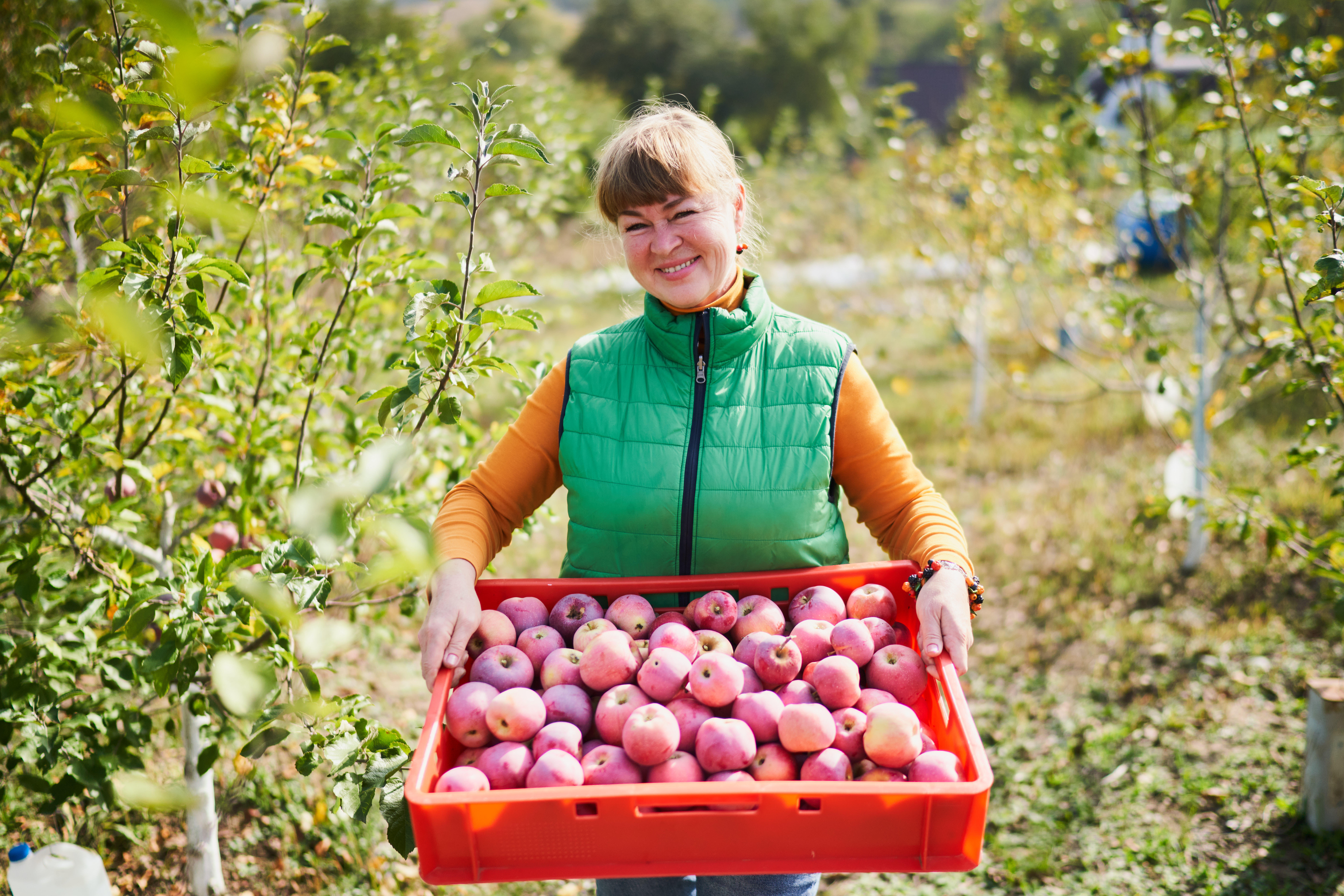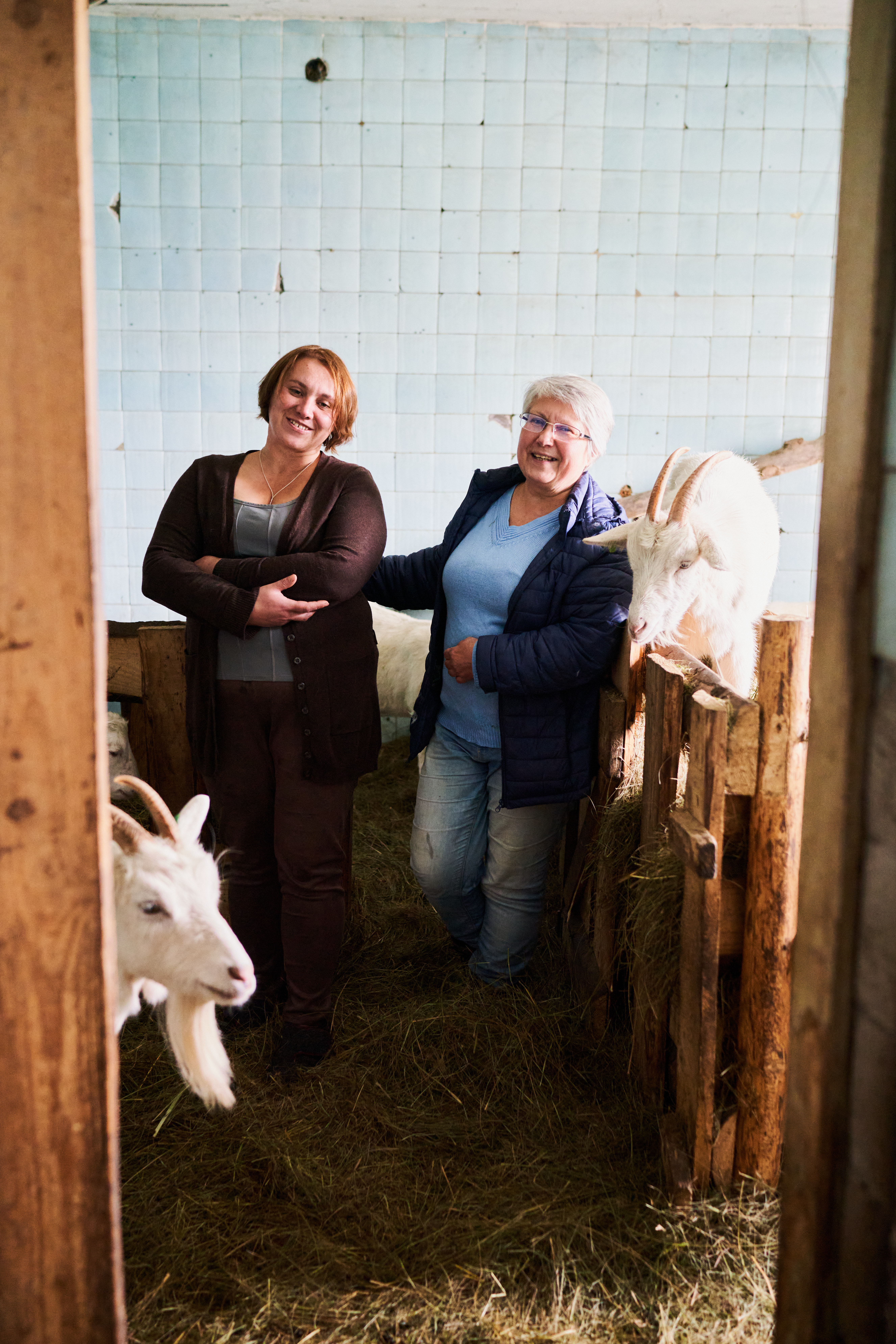Every year, on October 15, the International Day of Rural Women initiated by the United Nations is celebrated. Women from rural areas represent a quarter of the whole world's population and about 43% of agricultural workers. In Ukraine, every third woman lives in rural areas.
In 2020, Corteva Agriscience launched a financial and educational support program for women working in the agricultural sector in Ukraine called TalentA. This photo project was created by UNFPA, the United Nations Population Fund in Ukraine, which is a partner of the program and supports the women in Ukraine.
Valentina Sabelnikova
A year before the temporary occupation of Crimea, then 49-year-old architect Valentina Sabelnikova put into life a project of her dreams. Together with her husband, she created an eco-friendly kindergarten in Yalta and planned to open a farm next to it where children would learn to interact with plants and animals. The woman has a pedagogical education and assures that in such an atmosphere, children would grow up kind, caring, and physically and mentally healthy. But all the plans were ruined...
Having returned to Kyiv, the city of her childhood, Valentina could not abandon her idea and decided to implement it on her own plot of land in Mykolaivka village, Cherkasy oblast. Still in Yalta, when she was working on a kindergarten project, the issue of children's nutrition arose. Then she got a sense of the nuances of organic products from scratch.
“At that time, I realized that we had considered everything: methods of humane pedagogy, natural toys, ecological furniture, and mattresses stuffed with buckwheat husks, except healthy food. Buying in a supermarket is not an option. So, thanks to this project, I studied the Ukrainian organic products market inside and out,” says the woman.
Although Valentina had never even thought of agriculture before, 64 species of plants are growing on her farm now. The woman makes from these plants a variety of organic products for sale: candied fruits, dried vegetables, churchkhela, spices, fruit chips, pesto and marmalade. All the farm products are sold online.
According to her, gender biases in the agricultural sector are a reality that she has to face every day.
“There are no female farmers in our region at all. What backwardness! I felt some resistance, certain prejudices towards me, and it's hard for me. For some reason, the cooperation with men is preferred… There was a case of a partner who did not want to listen to me while discussing production issues because I was a woman. In such cases, no one prevents anyone from pursuing their own path. I try to surround myself with people I share values with, because otherwise you won't get anywhere with it”, the farmer believes.
Valentina also came to the conclusion that the biggest problem of Ukrainian farmers is the lack of education. In addition to starting her own organic brand, the farmer went into education. The family members conduct workshops for adults and children, advise on business projects and are speakers at conferences. Her goal is to raise a new generation of healthy children who are passionate about agriculture.
In order to work on the idea of creating a children's farming school, Valentina applied for the educational grant program TalentA implemented by Corteva Agriscience with the support of the United Nations Population Fund and she reached the final. During daily 3-hour classes, the woman strives to teach children how to grow safe food by themselves, process it and create with imagination alternative healthy sweets.
According to Valentina, the participation in the program allowed her to discover herself in a new way, taught her to better communicate with the audience and community, analyze her own ideas and implement new technologies.
“Customers’ feedback is very important to me. Their opinion is my motivation. I invest my soul, energy and love in my product. When a person is feeling better because of it, you see? I am sincerely happy”, the woman says.
If Valentina wins, she plans to develop a detailed curriculum document for children, purchase professional equipment: an infrared dryer for vegetables, a vacuum vessel that will conserve plants’ nutrients.
But most of all, the farmer's project seeks to change the mentality of people: “Can you imagine how scary it is when people treat their potatoes with chemical mixtures, and then eat those potatoes themselves and even give them to their children? This is a reality in the countryside. We have to radically change the approaches to children's nutrition and educate them. And then, maybe, their parents will listen to them”.
The farmer is sure that any experience is useful, and it is better to find opportunities rather than look for reasons.
“You shouldn’t think that something will not work. Thoughts are material. Psych yourself up that everything will be fine and look for opportunities. This develops creative potential and generates new ideas”, Valentina is convinced.
Kateryna Lisova and Kateryna Ilkiv
Kateryna Lisova 61 years old comes from Donbas but has lived in the Carpathians for almost 6 years. Before the war, Kateryna, a displaced person from industrial Alchevsk taught marketing and worked as a copywriter. Moving to Lviv region turned her life around.
Here, in the Carpathians, by a fortunate coincidence, she met a local resident Kateryna Ilkiv, a doctor by education and a future business partner. Together, the women won their first grant and began running a goat farm. Kateryna Ilkiv taught a native of Donbas the basics of agriculture: how to milk a goat, treat an animal, and Kateryna Vasylivna led the organizational work and searched for grants.
In four years, the herd grew from a few goats to 50 animals; the entrepreneurs moved the farm to a village that was visited by more tourists and began making cheese. Despite the heavy workload, the women run the farm together with the help of Kateryna Ilkiv's children and Mrs. Lisova's husband. Today, the Two Katerynas’ farm is known not only in the Carpathians, but also far beyond the region.
“Sometimes people recognize me in a taxi and start asking how we managed to do it”, says Kateryna Lisova. “But, unfortunately, we often see envy and attempts to ruin our business. The mentality is that, traditionally, a woman in a village is an attachment to the stove that also washes, cleans and spends her husband's money. Our example shows that women know how to do business and solve problems independently and can do it. If we need to do physically hard work, we will hire workers. But the problem here is that some men find it humiliating to work ‘for women’”.
In addition to gender biases, the businesswomen suffer robberies, and sometimes dogs are set on their cattle. The women say that 10 to 20 eggs disappear every day, and 40 broiler chickens were stolen over a month. Therefore, Katerynas plan to have video surveillance cameras installed and to equip themselves with protection means.
The main clients of the farm are tourists who come for excursions and tasting sessions. During a day, Katerynas receive up to 150 visitors, whose attention is attracted not only by high-quality organic products, but also by communicative animals.
“Tourists are delighted with our animals because they are usually met by animals first and then by us. Surprisingly, our chickens immediately flock around people, and the horse will come to you and sniff you around. This is because we love them very much”, says farmer Kateryna Lisova.
The women also organize free visits for schoolchildren and children from kindergartens and teach them not to be afraid of animals.
It is impossible so far to fully meet the demand for products, because the farmers do not have enough land for the herd expansion. Therefore, Katerynas buy milk from other villagers, but this is not enough either. According to the women, locals underestimate the goat business and, as a result, there are only 20 goats in the village with a population of two thousand people.
The businesswomen plan to obtain an organic production certificate and create a dairy cooperative to involve farmers in goat breeding. In this way, "people will consistently earn some money and farmers will have enough milk to produce cheese."
In order to put this idea into reality, Katerynas became participants in the educational grant program TalentA implemented by Corteva Agriscience with the support of the United Nations Population Fund.
The women do not conceal the fact that they both lack knowledge in the sphere of agriculture and advertising. Therefore, when they saw an opportunity to study, they immediately filed an application.
”I really liked the lateral thinking course. I can see that now I use this information every day while communicating with people at work. I also did not have the managerial experience, but now, having received instructions from mentors, I put them into practice”, says Kateryna Ilkiv.
Although Kateryna Lisova is a specialist in industrial marketing, the Internet marketing is terra incognita for her. However, the training filled gaps in this sphere and improved her skills of writing a grant application.
Kateryna advises those women who live in rural areas and think of setting up a business of their own ‘not to sit still, but to move forward’”.
“The main thing is not to be afraid to start. The first step will be followed by the second, third one… It will be difficult, but you will get into the rhythm. Self-fulfilment and independence are worth it”, the women are convinced.
Mariia Moseychuk
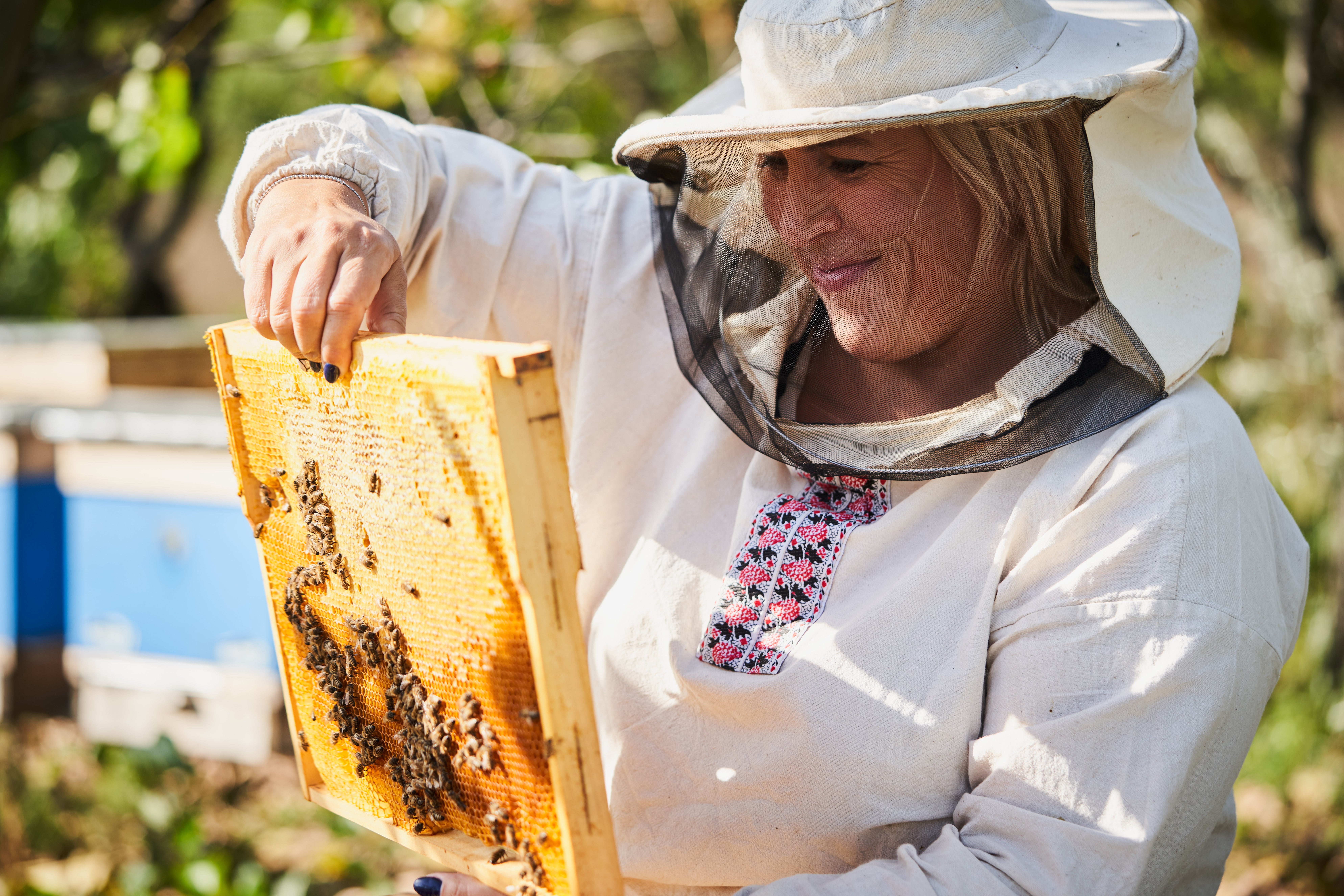
Mariia Moseychuk, 39 years old, has been leading a wholesale household chemicals company for 15 years, and she is raising three children. Two years ago, the woman was clueless about agribusiness, but now she owns 50 hives and seeks to create an apiary in Gunky village, Poltava region.
It all started with one phone call, when the godfather of Mariia's son invited her and her son to visit his apiary. The woman was so fascinated by working with bees that she decided to start her own business. Initially, she bought 15 hives and consulted with friends who were beekeepers on how to deal with them properly. During the winter, the quiet period for beekeeping, she prepared for the next season and studied intensively. Currently, Mariia already has a diploma in beekeeping from the Gadiach Agrarian School and is a student of the Odessa Agrarian Academy. She also participates in research and studies the pollination of farmland by bees.
Although, for the most part, the acquaintances supported the woman's idea, sometimes she has to face a prejudiced attitude against herself at work.
“I try to surround myself with like-minded people. Most often I hear: ‘Well done, Masha, you will do fine!’ But, for example, my husband was skeptical about beekeeping, because this business requires a lot of investment and time. Also, people sometimes wonder ‘how I deal with bees on my own’, because most beekeepers are men. Even though there are many women who support each other”, says the beekeeper.
In addition to honey production and pollination, the farmer completed a course in apitherapy - rehabilitation with beekeeping products. She assures that "honey is a super product" that makes it possible to maintain health and immunity. She believes that if we promote beekeeping, “our nation will become stronger and healthier”.
The woman also shares her knowledge with other beekeepers in the village and encourages them to join their efforts. According to Mariia, most of them are older people who lack resources and knowledge about new technologies and principles of production, product promotion. However, the woman does not have enough honey to enter new markets and distribution channels. As a solution to all the problems, she considers creating a cooperative with a single work shop that will operate in accordance with international standards. It is not without reason that the farmer emphasizes the “safety of honey”, because, according to her, the practice of pumping honey out in unsanitary conditions is still widespread. Therefore, she proposes to “forget the usual three-liter jars of honey” and create an automated packaging line, a facility for drying the pollen, and creamed honey making equipment. In addition, Mariia plans to build the most transparent communication with consumers so that they can see for themselves the safety of the product.
In order to implement the idea, the woman became a participant in the educational grant program TalentA implemented by Corteva Agriscience with the support of the United Nations Population Fund.
“I am very grateful to the program for the experience that gave me the opportunity to finally realize the importance of my project. I was caught most of all by the master class on Design Thinking, which completely changed my vision. I realized that I should not be afraid of long-term prospects. This is the experience I began to put into practice. Despite the results of the tender, I have already started renovation in my work shop to prepare the premises for the equipment I am going to purchase. The participation in the program also allowed me to understand the priority and importance of tasks”, says Mariia.
In the future, the farmer wants to start a Bee SPA and develop rural tourism. But she assures that all this is feasible only after international production standards are reached.
These days, beekeeping absorbs most of Mariia's time. She does not conceal the fact that this business is not easy, but she is not going to stop.
“It would be easier if there were more hours in the day. But I'm not complaining, I have good time management skills. When all people were at home during the quarantine, my family had a great time in the apiary. We have incredible nature around us. Working with bees, I sometimes catch myself thinking: “What a beautiful view I have out the ‘office window’”, says the farmer.
Mariia is sure that a journey of a thousand miles begins with a single step and she advises all women who doubt whether to start their own business to proceed.
“As the saying goes, ‘care and diligence bring luck’. The scariest thing is to make the first step. After studying with TalentA, my dreams became a clear business plan. And when a dream becomes a goal, everything will definitely work out."
Tetiana Stramnova
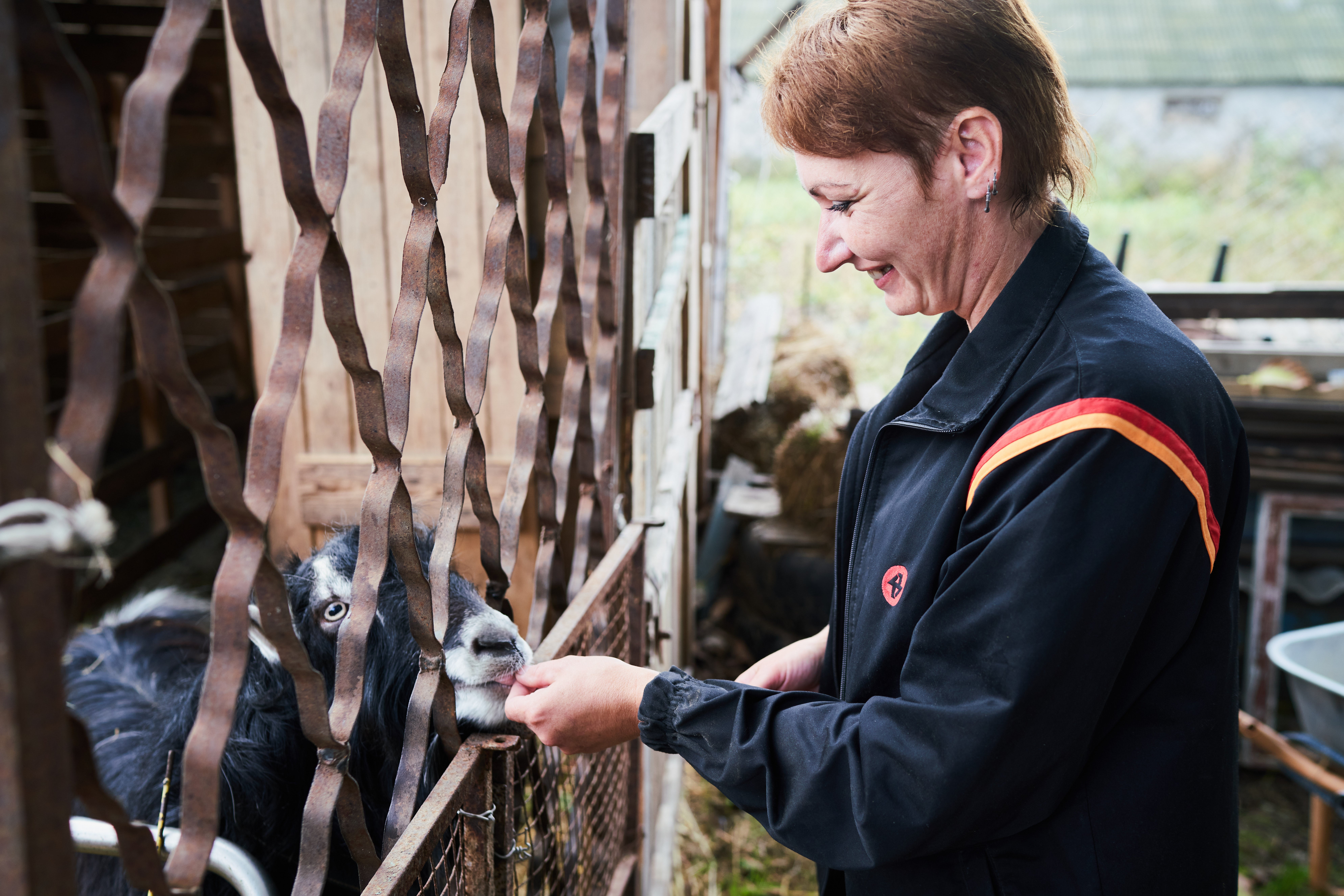
Tetiana Stramnova is the mother of two children with special needs and owner of a goat farm. When a school teacher once said that interacting with animals made her children develop better than the other kids, the woman thought about creating a contact farm for children with autism. The support from other parents strengthened the motivation.
“They approached me and said 'We are afraid for the future of our children. Your children know how to raise, feed an animal, and how to sell a product. And what about our children?’ Then I decided to start cheese-making master classes for children. In addition, the teachers convinced me that the interaction with animals is important for the development of such children, because in this way they learn better and improve their fine motor skills easier”, says Tetiana.
In addition, if the farm is successful, it will be able to provide these children with jobs in the future.
Tetiana started up in agribusiness in Donetsk 12 years ago thanks to her children. Her life was not linked to agriculture. Being a computing machine operator by profession, she completed a course in accounting and worked as an artist-designer. The birth of a daughter prompted the woman to breed birds in order to feed the child with meet that was always fresh and natural. The peculiarities of health forced her to raise guinea fowls, and later quails because their meat and eggs are considered the healthiest. So Tetiana became the owner of a quail farm.
With the outbreak of war in Donbas, the woman had to move to Muzykivka village, Kherson oblast, where she first tried to resume the poultry business, but later she began to raise goats. At first, she had only two female goats and one male goat, but over time, the herd grew, and now Tetiana is the owner of 25 animals. When there was an excess of milk, the woman decided to make cheese. According to Tetiana, the local community provides great support, but at first, her female acquaintances did not understand her intentions and thought that it was worth staying at home and taking care of the children. However, in spite of everyone’s opinion, she reached her goal.
“I heard that ‘Business is not a woman's occupation’, ‘You will not succeed’ and ‘You are not good enough to manage such a farm’. However, on the contrary, it strengthened and motivated me. Why should I fail? Everything will be fine. Then strangers told them what a good woman I was, that I didn't get broken, and so they put up with it. I do not hear any special praise, but now, if necessary, I can count on their help”, says Tetiana.
The woman has already made arrangements with the specialists of the school where her children go to hold classes on the farm. Tetiana will teach the pupils cheese-making, behavior with animals and nuances of caring for them, and teachers will follow the school program, but with the animals involved in the process. The businesswoman says that her farm will be available to everyone in the future.
According to the woman, all farm-based classes with children who have special needs will be free, and earnings will come from the sale of cheese and commercial tours.
In order to implement the idea of a contact farm, Tetiana Stramnova applied for the educational grant program TalentA initiated by Corteva Agriscience with the support of the United Nations Population Fund and became its finalist.
“Honestly, my attention was drawn at first to the grant amounts, but I realized during my studies that the knowledge and experience gained are invaluable. During the courses, I immediately made changes to the project and put the ideas into practice. Yes, I finally succeeded in entering the market to sell products”, says Tatiana.
According to the farmer, the most useful master class was Design Thinking: how to properly approach the consumer, position your product, conduct surveys and find your niche in this business. Tatiana says that she could not understand at first why she should develop a portrait of a person, because she herself is a mother of children diagnosed with “autism” and understands all the nuances. However, after conducting a survey among parents, she was surprised at how many mistakes she had made, not taking into account the capabilities and abilities of other children.
In addition, Tetiana says that the mentors helped her rethink her priorities and believe in herself.
“I focused at first on the business, earnings and development of the cheese dairy. Working with children with autism was secondary”, says Stramnova. But while studying, writing a grant project, I was so fascinated by the idea, I had a certain mission. If I was afraid before, I thought that I would not succeed or I would not be properly perceived with this idea, then after talking to mentors and children’s parents all doubts disappeared. I became convinced that the contact farm was what we really needed. It was something that such children and their mothers really lacked”.
Given her experience in agribusiness, Tetiana wishes all women determination and self-confidence.
“It was very difficult for me in the beginning; the people closest to me discouraged me from having my own business. But that shouldn't stop you. Business is not just for men. Move forward in spite of anyone’s opinion and in spite of everybody. As they say, nothing ventured, nothing gained. Work hard and then you will have a result,” advises the farmer.
Iryna Gavrysh
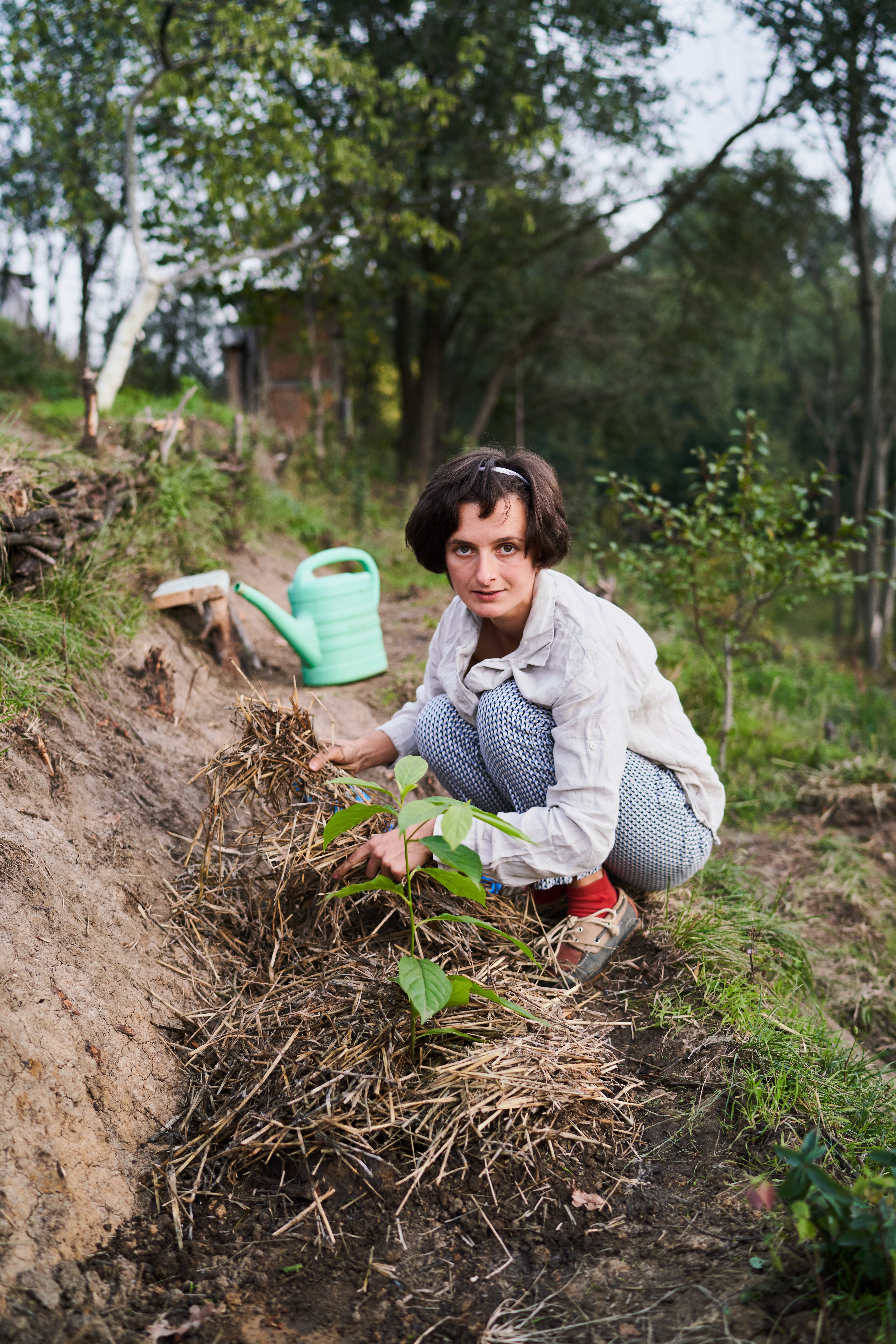
32-year-old Iryna Gavrysh has been living in the small village of Klochky, Kyiv region, for 7 years and is engaged in farming. If most people want to move to the city, Iryna and her husband, on the contrary, deliberately moved from densely populated Lviv to a village with a population of 70 people in order to be closer to nature. Their son was born in Klochky, and so was the woman’s new hobby - permaculture.
“This is sustainable farming in friendship with nature. This is a way of designing and creating a system in the yard - from the system of thinking to the system of trees spacing in the garden. So that plants are in friendship with insects, animals and yield a crop with minimal human intervention. And it is important that the crop is completely organic,” the woman explains.
After they had moved, the family of artists continued to plan to earn money through art; however, their priorities changed with the birth of a child. According to Iryna, in parallel with raising her son, it turned out that it was easier to be engaged in farming than in designing. Fruitful training on how to properly lay the foundations of permaculture showed results: surplus of products. The family gave their friends and sold seedlings, herbs, teas, but later decided to write a business plan for the development of a farm. Now the female farmer's goals are to get an Organic standard certificate and sell online.
After taking an international course in permaculture design, the woman can develop such gardens on a commercial basis. However, she points out that now her farm is priority No. 1.
Iryna admits that, previously, she stereotypically believed that a woman was physically weak for farming. Nevertheless, she debunked this stereotype by her own example.
“It turned out that I can dig well, work with a wheelbarrow, have mastered all the tools. I can do any work. I haven't encountered any gender prejudices, men treat me with respect”, says Iryna Gavrysh.
The farmer has eaten no meat for many years and is concerned about environmental issues, so the zero waste concept is the basis of her family life. But according to Iryna, most of the villagers live by a different principle and dump all the garbage in a ravine in the middle of the village. Some of them burn it in the gardens. It is because there is no organized waste removal in Klochky, and the improvised dump in the center of the village is a result of a long-standing habit. Iryna and her husband decided to tackle this problem.
To do this, the woman became a participant in the educational grant program TalentA initiated by Corteva Agriscience with the support of the United Nations Population Fund and presented a project with the goal to clean up the dump and turn the ravine into a walnut garden. The farmer is sure that if the area is improved, it will be morally difficult for the villagers to litter it. She has already agreed with a company in Bila Tserkva on waste removal and she plans to install sorting tanks in the village and teach people how to properly handle waste. After all, waste is an excellent fertilizer.
Most residents of Klochky village are elderly people who often “find it difficult to accept new information”. But Iryna is determined and is going to convince them by talking it through over tea.
“TalentA inspired me to go out and talk to people about a common problem. There is some resistance, but most people are aware of the need to deal with garbage, and they listen to me. I know for sure that I will implement this idea, regardless of the grant competition results”, says Iryna.
Moreover, the creation of a walnut garden on the dump site will solve the problem of children’s unvaried diet in the kindergarten. According to the woman, the menu in this institution is very poor and mainly includes potatoes, beets, and pasta. The villagers will send the first harvest to a sanitation center for control, and then they will make healthy snacks for children.
When friends told Iryna about the TalentA program, she was amazed at how the principles and values of the project were similar to her own ones, and she immediately applied.
“Honestly, I was very surprised that such a large company as Corteva Agriscience did such noble things as caring for the environment and sustainable farming. I had never seen such attitude in Ukraine. That's why I was very responsive and motivated”, says the farmer.
Iryna began to put new knowledge into practice during her studies. According to her, business planning and financial aspects were the most difficult to master. After all, their business is still small and they have not encountered such things yet. Today, the Gavrysh family have already developed a strategy, outlined goals and defined their own audience. The woman assures that a positive result is already noticeable.
Iryna advises to start own business by making small steps. “I didn't set big goals for myself at once and I gradually went towards my goal. Just like this, go forward by small steps, with love, with respect for nature and people. You must do everything from the heart, as if you were doing it for your family. And then there will be a response, people will definitely understand, feel and follow you”.
Vira Popaz
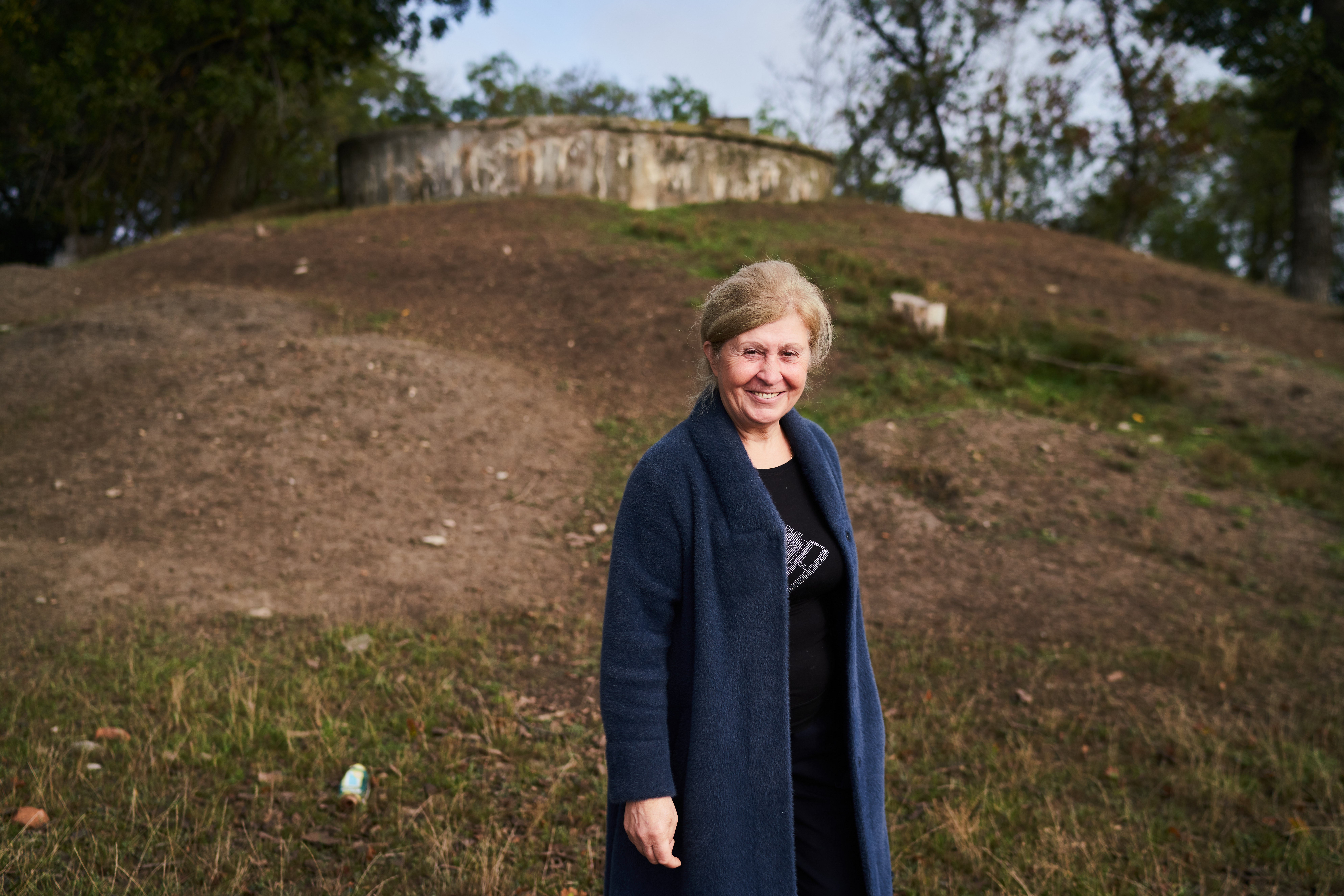
65-year-old Vira Popaz has been engaged in agribusiness for 40 years and is not going to stop there: she is open to new knowledge and has a lot of ideas. Having experience in managing the production of a winery, the woman created a cooperative in order to solve the problems of Kubey village community, Odesa oblast.
After the retirement, the farmer mastered the hotel business from scratch and gathered around herself like-minded people who are not indifferent to the development of the village. The woman says that in the Soviet times the local economy was one of the most powerful, and it went into decline in the 1990s. So, realizing the potential, Vira together with the villagers decided to restore the past power.
Currently, the cooperative owns 30 hectares of land where vegetables, fruits, grapes and berries are grown. Crop yields declined due to unfavorable weather conditions, so farmers want to install a greenhouse and shift to the line production. The cooperative does not have a centralized sales system so far, and goods are being sold at local markets. But the woman is sure that it is necessary to process raw materials so that products could be sold all year round.
“We want to pack in jars and dry vegetables and fruits in order to store products longer, but relevant equipment is expensive, so we need investment”, says Vira Popoz.
In addition to crop farming, the farmer seeks to develop tourism. According to the farmer, Kubey is situated at the intersection of three highways, where there is a large flow of tourists from Moldova, Bulgaria and Romania. But there is no place to accommodate them because there are no hotels in the region. Therefore, the woman decided to create a hotel and restaurant complex with a conference hall, its own bakery, brewery, swimming pools and water purification system.
Although the village is located above a large lake and local water is purchased by other settlements, this water does not meet DSTU standards. The woman is convinced that this issue is urgent, as almost 7,000 people consume poor quality water every day. Vira Popaz became a participant in the educational grant program TalentA and presented the following idea. After the installation of the water treatment facilities system, the cooperative will sell water at cost and also provide it free of charge to the community schools and kindergartens.
The construction of the complex would also solve the issue of lack of employment opportunities and of local youth moving to the cities.
“In fact, we have everything to implement the idea: an inspired team, premises for the complex, but we have not enough money for the renovation. The opening of the complex will create jobs, promote community development, attract tourists, replenish the local budget and improve the life of the village as a whole”, said the businesswoman.
According to the woman, village people work a lot on the land, and there is no opportunity to have a good rest in the community. Therefore, the availability of swimming pools and a restaurant will help diversify the leisure of local residents.
Vira Popoz admits that it is difficult to start because many people distrust the idea of uniting. She attributes this to the fear of being deceived. But, so far, there are 7 like-minded persons in the cooperative, whom Vira Popoz calls “pioneers”.
The woman has also repeatedly faced manifestations of ageism against her, but, nevertheless, she is confidently moving towards the goal.
“Of course, sometimes I can hear the phrase ‘You take on too much at your age’. However, I live for my work and such a workload is well within my power. As long as I am healthy, I do not plan to sit still”, says Vira Popoz.
To all others who have doubts about the idea, the woman is going to prove its feasibility by deed, not by word, and she believes that they will be able to move on with the help of TalentA.
“Even if the program did not provide for grants, I would still be happy to study again. After all, I understand that we still have a lot to learn, so I try not to lose opportunities to do so”, says the farmer.
Master classes on legal aspects, writing grant applications and investment raising were most useful.
For those women who still have doubts about starting their own business, Vira Popoz advises to gather around themselves people with common values and to study.
“I think that participation in various programs and projects makes you free from biases and gives you confidence. There are always more doubters than supporters. So you should learn and believe in yourself”, the woman says.
___________________________________
At the end of 2019, Corteva was one of the first 14 companies to sign with UNFPA, the United Nations Population Fund, a joint declaration on gender equality and prevention of domestic violence. As part of this initiative, the participating companies committed to making every effort to implement gender-sensitive approaches in their activities by 2025, create conditions for decent work and equal employment, and establish a policy of zero tolerance for domestic violence.
Today's initiative not only promotes the economic capacity-building of women in rural areas, strengthens their leadership skills, but also raises their awareness of gender equality, domestic violence issues and existing protection mechanisms. This will make a significant contribution to the achievement of global SDGs, which are recognized priorities at the national level in Ukraine, in particular SDG 5 Gender Equality and SDG 8 Decent Work and Economic Growth.
Photographer: Valentin Kuzan
Texts: Anastasiia Shepeleva

